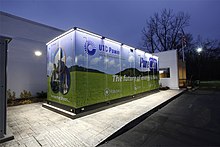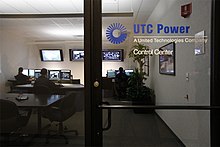UTC Power
| Company type | Former Subsidiary of UTC |
|---|---|
| Industry | Fuel cell |
| Founded | 1958 (under Pratt & Whitney for NASA's Apollo missions) |
| Headquarters | South Windsor, Connecticut |


UTC Power was a fuel cell company based in South Windsor, Connecticut. It was part of United Technologies Corporation; it was purchased by ClearEdge Power in February 2013. The company specialized in fuel cells for buildings,[1] buses[2] and automobiles.[3] It has also developed fuel cells for space[4] and submarine applications in the past.
History
[edit]UTC Power began as a division of Pratt & Whitney in 1958. In 1966, the company supplied fuel cells to NASA for the Apollo project space missions, to supply electric power and drinking water for the astronauts on board and, later, for the Space Shuttle missions until 2010. In 1985, the company became a wholly owned subsidiary of UTC under the name International Fuel Cells. It was later renamed UTC Fuel Cells in 2001,[5] and became UTC Power in 2004.[6]
In the early 1990s, UTC Power commercialized a large, stationary fuel cell for use as a cogeneration power plant. The company has expanded into the broader fuel cell industry over the last 10 years, developing fuel cells for automobiles and buses.
In February 2013, UTC Power was sold to ClearEdge Power.[7][8]
Fuel cells for buildings
[edit]UTC Power’s stationary phosphoric acid fuel cell product is the PureCell Model 400 System.[9] This stationary fuel cell system provides 400 kilowatts of electricity and 1.7 million Btu/hour of heat. The PureCell System is considered a good match for combined heat and power applications including supermarkets, hospitals, hotels and educational institutions.[10] The UTC Power fuel cell system uses natural gas which is converted in a "catalytic reformer" into hydrogen, carbon dioxide, carbon monoxide, and water. The hydrogen is used to run the four fuel cell stacks to produce electricity and the power plant then converts the exhaust heat into cooling and heating, turning potential waste into usable energy. The product has a 10-year cell stack durability and 20-year product life.
UTC Power has designed, manufactured and installed more than 300 stationary fuel cells in 19 countries on six continents. The fleet has exceeded 9.4 million hours of field operation and has generated more than 1.6 billion kWh of energy, enough to power nearly 140,000 homes for an entire year. PureCell Systems are operating at Whole Foods Markets in California, Connecticut, Massachusetts;[11] Price Chopper stores in New York,[12] a Coca-Cola Refreshments bottling facility in New York[13] and another in Connecticut,[14] a powerplant in South Korea,[15] and at other sites around the world.
Fuel cells for buses
[edit]
The PureMotion Model 120 System was UTC Power’s zero-emission proton exchange membrane (PEM) fuel cell for transit buses.[16] UTC Power’s PureMotion Model 120 system is powering a fleet of transit buses in Connecticut and California.
On Friday, March 16, 2012, UTC Power participated in an event hosted by Senator Richard Blumenthal (D-CT) to highlight U.S. Senate passage of federal surface transportation legislation.[17] The event was held at CT Transit facilities in Hartford and included representatives from the Connecticut Department of Transportation.[18] On Tuesday, the U.S. Senate passed a two-year reauthorization of federal highway, transit and safety programs to fund highway and transit improvements nationwide. The legislation included a Clean Fuels Grant Program to prioritize funding for transit agencies to purchase zero emission passenger buses.[19]
Fuel cells for automobiles
[edit]UTC Power developed and manufactured PEM fuel cells for automobiles.[20] The company worked with BMW, Hyundai and Nissan as well as the U.S. Department of Energy on development and demonstration programs.
Energy Security
[edit]The UTC Power Control Center monitored the global fleet of PureCell systems 24/7 and often detected potential problems before they could impact successful operation of the system, ensuring maximum uptime for customers. Each PureCell included an internet-based communication system, called the Remote Monitoring System (RMS). The RMS provided the Control Center with remote access to fuel cell operating data and allowed limited control, including start-up, power output kW set point and shut-down commands. The fuel cell could independently “call out” to alert technicians of out-of-limit parameters, status, and need for maintenance. The RMS also supplied the system owner with website access to view the fuel cell’s operating status.
References
[edit]- ^ Elsevier Ltd, The Boulevard, Langford Lane, Kidlington, Oxford, OX5 1GB, United Kingdom. "UTC Power fuel cell for San Jose supermarket". Retrieved 12 November 2014.
{{cite web}}: CS1 maint: multiple names: authors list (link) CS1 maint: numeric names: authors list (link) - ^ "Next-Generation Fuel Cell-Powered Buses Introduced in Hartford". CT Transit. 15 October 2010. Archived from the original on 18 September 2013.
- ^ "UTC Power Fuel Cell to be Driving Force Behind New BMW Hybrid car". 26 March 2010. Archived from the original on 11 July 2011.
- ^ "Space-age technology helps drive automobiles - Technology & science - Tech and gadgets - TechNewsDaily - NBC News". NBC News. Retrieved 12 November 2014.[dead link]
- ^ "UTC Renames IFC Unit as UTC Fuel Cells". EE Power. December 11, 2001.
- ^ "United Technologies Corp. to sell UTC Power to ClearEdge Power". MassLive. December 12, 2012.
- ^ Nirappil, Fenit (February 12, 2013). "ClearEdge Power finalizes acquisition of UTC Power". The Oregonian. Retrieved 24 February 2013.
- ^ "UTC out $227M to unload its fuel cell unit". Hartford Business Journal. 6 May 2013.
- ^ Thomas Content. "Diversey installs fuel cell to help heat, power headquarters". Retrieved 12 November 2014.
- ^ STAR STAFF. "Hospital generates clean power". Napa Valley Register. Retrieved 12 November 2014.
- ^ "Dedham". Whole Foods Market. Retrieved 12 November 2014.
- ^ "Price Chopper Powers Supermarket With 400-kW Fuel Cell Unit - PerishableNews". Retrieved 12 November 2014.
- ^ "UTC Fuel Cells Energize Coca Cola Production Facility". Green Energy News. 21 October 2010. Archived from the original on 14 June 2012.
- ^ "Coke installs UTC fuel cell in East Hartford". Hartford Business Journal. Retrieved 12 November 2014.
- ^ "UTC fuel cells to power Korean utility". Hartford Business Journal. Retrieved 12 November 2014.
- ^ BioAge Media. "Green Car Congress: UTC Power Transit Bus Fuel Cell System Sets Durability Record". Retrieved 12 November 2014.
- ^ Gretchen. "Blumenthal Applauds Clean Fuel Programs In Transportation Bill, Urges Action By House". Retrieved 12 November 2014.
- ^ "Blumenthal Applauds Clean Fuel Programs In Transportation Bill, Urges Action By House". 16 March 2012. Retrieved 12 November 2014.
- ^ "New Blumenthal Applauds Clean Fuel Programs In Transportation Bill, Urges Action By House". Retrieved 12 November 2014.
- ^ "UTC Power Fuel Cell Part of New Hybrid Electric Vehicle on Display in Munich - FuelCellsWorks". Retrieved 12 November 2014.
